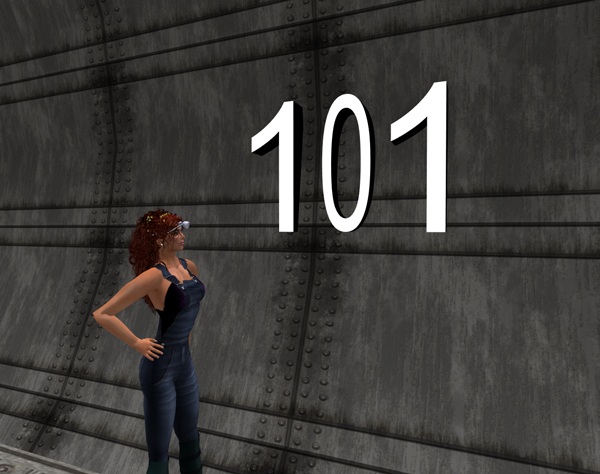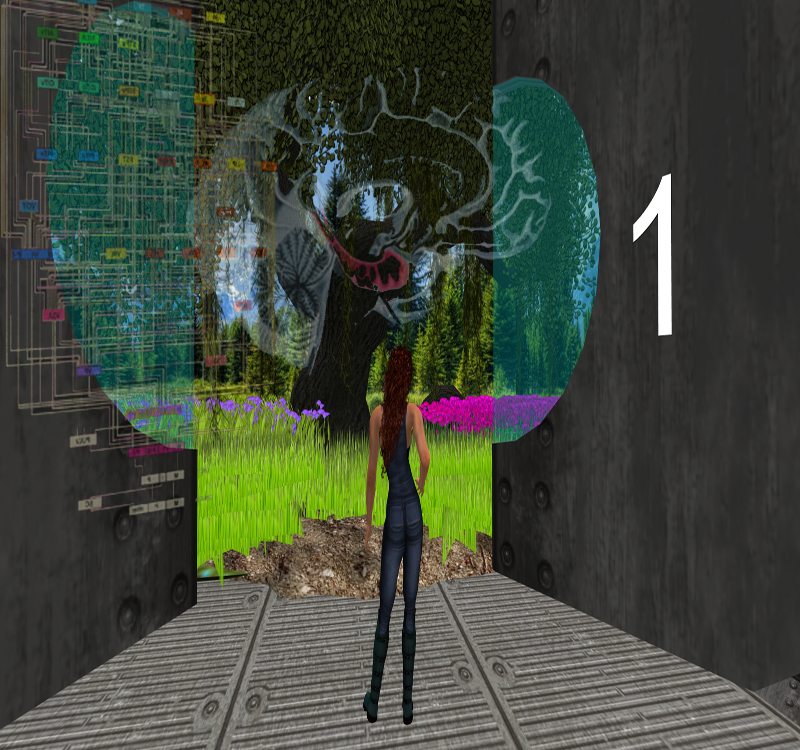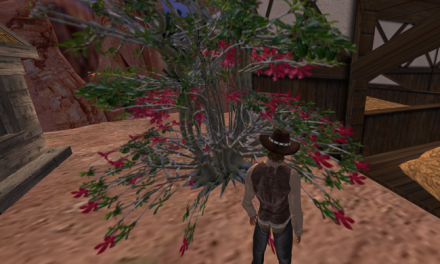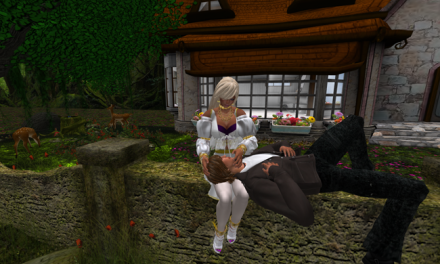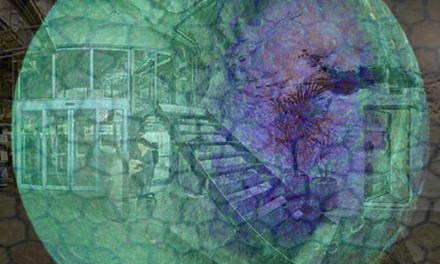By Anna Sykora
Kate edged aside the old tire and peeked out the end of the section of pipe. Beyond the fringe of plastic birches, hundreds of handers marched two by two, heads bowed, shoulders drooping, out of the Central Materials gates. Ten minutes till the iron gates clanged shut. The sky vault still shone dirty grey, and a cam on a pole above the spindly trees swiveled and clicked. Ducking back into the pipe, the wiry redhead pulled the tire over the opening.
“Any sign of Gracie?” Lou whispered, lean face tense.
“No,” said Kate. “We have to leave without her.” Nervously he touched the small cube under the skin at the base of his neck, directly above the collarbone:
“I can’t leave Gracie here.”
“After what I risked to make us papers? Give me your map and I’ll go by myself.” Pointing at her lips Kate mouthed the words, “Break the Crave.”
His eyes widened. “You really mean it.”
“Come on, or get recycled for your proteins.” She shrugged a knapsack onto her back.
“Wait,” cried a voice from the pipe’s open end, which darkened with Gracie’s plump silhouette as she crawled inside with two bulging bundles.
“What took you so long?” Lou gave her a hug. “They’re going to lock us in.”
“Honey, don’t be mad. I brought us discards from my shift in the cafeteria. Nice soy fibers, seasoned with salt.”
“All you ever think about is food,” Kate hissed.
“Actually I’ve had second thoughts. I’m not strong enough to leave Vault City. I want to stay here, working as a hander.” She straightened the bib of her overalls. “What else can a poor clone do?”
“Gracie, you’ve had two whole months—”
“Listen,” Kate broke in. “I’m supposed to report to a new plant Monday. Could be a front for euthanasia. If we don’t leave the city tonight . . .”
“I’ll still have Lou.” Gracie stroked his hair.
“For as long as our masters allow,” he said bitterly. “Come on, we can’t waste this chance. How often does a hander find an old map in a bundle of scavenged goods?”
Gracie pouted. “OK, honey. If it’s what you want.” Slowly she gathered her bags.
“Let’s do it. Fellow clones, be brave.” And Kate shoved the tire aside and crawled out. The sky vault still shone milky grey, except for one blacked-out hexagon. She pointed at it: “That’s bad for morale. Our good masters should fix it, quick.” Head high, she marched toward the iron gates.
“They’ve got better things to do,” Lou muttered, falling into step behind her.
“Like looking for poor handers who go astray,” said Gracie nervously. As the heavy gates began to groan shut, a bot rolled out of his adjacent cage, the lights in his forehead flashing yellow:
“Handers, what are these extra rations?” His jointed claws reached for their bags and bundles.
“Rewards for our overtime this quarter.” Calmly Kate held out the receipts she’d forged, and his eye-cams scanned them:
“You three are certified; you may pass.”
Go ahead and list us for recycling, you droning hunk of scrap! She thrilled with defiance, and then relief. Watching and listening at their consoles, the masters had not yet solved the problem of detecting guilty thoughts. So off she marched with her friends down the rutted road, past the low, hander hives on either side. High in the distance, the clustered villas of the masters glowed golden and serene, like the palaces in a dream . . . Soon frantic music pulsed from the Arcade, the pleasure quarter reserved for handers, where neon flashed: FRIDAY SPECIAL—SPEND YOUR NIGHT IN A DRUNKEN CRAVE.
Standing at the crossroads, an old hander in baggy, grey overalls waved his arms as if eager to fly away. “My fellow clones,” he preached to the crowds passing by, who paid no attention. “To crave is evil. Our real purpose is to seek the truth.”
“Shut up, you old fool,” warned a broad-backed hander with a hammer strapped to his thigh. “Before our good masters note your words.” When the cube in the preacher’s neck lit up, Gracie stopped and stared.
“Come on, honey.” Lou tugged her arm. “They’re going to make an example of him.” The old hander crumpled as if hit by a truck, and wallowed in the road, tongue hanging out.
“Take me, masters,” he babbled then, eyes rolling back in his head. “Just stop this crave—it’s burning my guts—and I’ll do whatever you need.”
Swooping down, a white-winged saver vehicle maneuvered to a stop. Three white-robed masters with gleaming silver skin disembarked and surrounded the old hander. Curled on his side in the dirt, he whimpered helplessly.
“Hander, do you agree to take your medicine?” a master demanded. “For the good of your class, and of Vault City?”
“I do,” he squeaked, and another master plunged a long needle into his neck. At once he went limp as a rag, and the masters loaded him onto a stretcher.
“Move along,” cried a rusty bot that came rolling out of the Arcade. “You can see this old working clone is peaceful.” The masters slid the stretcher into the saver.
“Is he dead?” shrilled Gracie.
“No,” soothed the master who’d given the needle. “He’s sleeping like one satisfied. Only our medicine satisfies your crave. Remember that when you visit the Arcade.”
“But we are going the other way,” said Kate.
“And why is that?” the rusty bot asked as the saver whooshed back into the air.
“Urgent duties, officer. A water main burst in Sector 5.”
“In that case, go; and I wish you happy toil.”
The friends marched off again in single file, but once out of cam-shot they joined hands, skipping along like clones freshly emerged from the masters’ tank.
“So far, so safe.” Lou pulled the old map out of a pocket in his overalls. Now he led the way through lonely streets, where cams and lights grew sparse. The city’s vault hung dark tonight, devoid of its artificial stars undergoing maintenance.
“Are you sure it’s this way?” Kate asked.
“If this map’s coordinates are right,” he retorted, and Gracie giggled nervously.
Soon the three arrived at a collapsing wall, daubed with DANGER—HANDERS KEEP OUT
“Oh I don’t know,” moaned Gracie. “If the masters find us here they’ll recycle us.”
“Anything’s better than toiling for them until these body parts wear out.” Lou pried a loose brick out of the wall, an antique brick of a reddish color almost like the flesh of ripening clones.
“Let’s put these on.” Kate held up three wafer lights clipped to headbands.
Hours later, in the bluish glow of the lights, the friends emerged on the wall’s other side, next to a brick hut with broken windows.
“This must be the entrance,” said Lou.
“Why don’t they use it anymore?” Gracie fingered the frayed, still shimmery curtains. “I’ve never seen any stuff like this. It must be virgin material.”
“The masters don’t want to give us ideas. They’re the only ones allowed to think,” said Kate.
“At least some of us can still remember.” Lou folded up the map, kissed it and stowed it away in his knapsack.
Following the others inside the hut, Gracie said in a small voice, “This is scary.” She turned up the power on her wafer light.
“Please don’t waste energy,” Kate scolded.
“But this dump smells rotten. I bet it hasn’t been cleaned since the ancient wars. Oooh!” Gracie jumped back from a skeleton moldering on an inside door. The skull sagged forwards, a look of dismay in its eyeless sockets.
“They just tied it here to frighten clones away,” said Lou, a tremor in his voice. “But we’re not younglings fresh from the tank.”
“We are bold, we venture forth,” Kate sang out to the cheerful tune of the Handers’ Hymn. “We are humble, we obey . . . .”
“I’m afraid of the crave. Afraid.” Gracie tapped the cube in her own neck.
“Don’t—that’s a key word,” Kate hissed. “They’ll hear you; we’re not out of range.”
“Oh help me, good masters, give me peace.” Gracie clasped her hands. “Cause I can’t bear the fires of the crave.” She flung herself down on the rotten floorboards, and then peeked back up at Lou: “I’m sorry, honey. I’m too weak.” She reached for him, but he turned away.
“Come on, Kate. Before the masters arrive, to save her. This must be the door.”
“Don’t leave me.” Gracie burst into tears as he shook her off and Kate pulled open the door—dislodging the skeleton, which fell with a clatter. The two friends plunged down steep, stone stairs together, into an unlit, musty basement. Gracie, who did not follow them, shouted, “You’ll never find the way out!”
But the basement opened out into a wide and smooth-floored tunnel, cut from the city’s granite. In the pale blue glow of their wafer lights the two hurried on in silence. As the tunnel ascended gently, old-fashioned numbers still glowed on the right hand wall: 110, 109, 108.
“They must have built this back in the ancient days,” Lou said, “when they excavated the city’s vault.”
“I just hope this tunnel is the one the sagas praise. The one that leads back to the world that was.”
“Wherever it leads, it’s our only chance.”
“But what if the masters send bots after us? They can roll faster than our legs move.”
“I don’t believe they will,” he said firmly. “The masters believe their own propaganda: that Vault City is a perfect system, with 100 percent recycling of materials, energy, and ideas. Anyone who tries to leave does not exist. Or so they pretend. We’d spoil their perfect image of themselves.”
“Lou, I respect how you’ve thought things through.”
“I’ve had time to try to learn how to think, assigned as a solo garbage collector. You never got so much time alone, assigned to the inventory team.”
For a while the two friends trotted on together, the rhythmic thud of their work boots echoing. 102, 101, glowed the old signs on the wall.
“I need to rest,” he said after a while. “I’ve got an awful cramp in my side.”
“No. We have to outrun the crave,“she mouthed the last words, out of habit. “We’ll have plenty of time to rest or sleep once we’re out of range.” She peered back, as if still expecting a phalanx of armed bots to come rolling. At least this old tunnel offered no forks, no turns. No more choices for a clone.
#
Hours later she felt a slight vibration in the base of her neck, and swallowed hard. “Lou, did you feel that twinge just now? Like a warning.”
“Yes. They have located us. Maybe we’re almost out of range?” Gripping her arm, he hurried her along. 89, 88, 87…
Suddenly a sweet stench clogged their lungs. Then they almost tripped over a soft heap. A hander in overalls, rotting away. Had others tried to escape?
“I’m losing my nerve,” Kate blurted out. “What if we’re not strong enough? We’ll die here and rot, like this poor clone.”
“We have to believe we are strong enough. Just put one foot in front of the other.”
Now she staggered onwards, clutching her head, the sly pain that teased behind her eyes widening into a roar that deafened every word, every hope . . . . Then came the ravenous hunger of the crave, the vicious fire nothing could quench but a dose of the masters’ medicine—stabbed directly into her neck. Those were the teachings, anyway.
“Come back to Vault City,” cried a voice in her head, solemn and stern as a hidden god. “Come back to us—you poor handers, gone astray—so we can save you, and recycle you.”
Then Lou cried out and sank to his knees, shaking his head. Pushing in front Kate grabbed his hands, but he felt heavy as a block of granite. His eyes were rolling back in his head.
Peering down at his suffering face, suddenly she felt such a wave of rage—such hot fury at the cunning masters—it drove her inner pain aside. “Stop screaming at me,” she shouted. “Get out of my head, and leave me alone.” She clawed at the implant in her neck as her words echoed in the endless tunnel.
“I can’t go on,” Lou said hoarsely. “Katie, I’m not strong enough. Please don’t waste this chance.” She touched the skin over his glowing implant: hot as fire. The cube’s hard edges seared her hand. “Aaah!” he screamed, arms and legs flailing.
“What if we cut it out?” she gasped.
“We’ll die. You know the rules.”
“That’s what they taught us. Maybe it’s a lie?”
“Go ahead; they’ll kill us anyway.” He clenched his eyes as she drew a short blade from a chain around her neck.
“Open your eyes,” she begged. “Please, hold up your light for me.” The to keep him going, not able to see her neck where she probed with blade.
When she gouged into her neck, the implant felt like an iron hand strangling her. “Hander, die,” screamed in her head. “You can’t escape Vault City’s masters.” Digging her fingernails under the cube, she felt the coated wire that threaded up the nape of her neck, into the depths of her brain.
“Lou, I’m gonna pull this out.” The thin wire stretched taut, it snapped in her hands. And no, she did not die . . . .
“You see?” she cried in triumph as the voices of the masters ebbed away. She crushed the bloody implant under her boot heel. Never again would she obey…
Weeping, Lou offered his neck to her knife; but the point slipped, and blood gushed, splashing her face. Had she hit an artery?
She tried to cover the pumping wound with her hands. Lou felt so cold . . .
“Hurry and go…for all of us,” he murmured. “You go find it. The world that was.” His head dropped back, and his eyes glazed over. Tenderly she closed them with her palm.
Then she sprinted onwards up the tunnel, heart pounding, her aching lungs working double time. Only when her sore legs felt like water did she dare glance back.
Far, far behind, Lou’s bluish light still flickered like a match in the dark, and suddenly she felt a pang more intense than any crave. She was leaving her best friend dead; to search for what might not even exist.
Sobbing she stumbled onwards, and soon collided with a heap of dry bones, which cracked like plastic under her boots. Bile rose in her throat, and she retched for minutes, as if to vomit her own heart. Holding out her hands then, to steady herself, she told the ruin on the ground:
“Lou is dead, and you are too, but I am still a hander.” When she peered into the dark and nothing peered back, Kate howled at the top of her lungs: “To hell with the crave. To hell with our masters!” And nothing happened, nothing at all . . . .
Filled with grim satisfaction, she staggered on alone. She found no more bodies in the tunnel. Who had made it this far?
Hours later she devoured her last protein bar, and tossed away the wrapper. Let the bots track her, let them find her bones, let them see how far she’d come.
Soon her last wafer light flicked out. She made a fist in front of her face, and opened her fingers: nothing to see.
There should still be the old numbers, though; the numbers counting down. Sinking to the ground, she crawled on stubbornly, hands and knees all sticky with blood. 42. 41. 40. 39. 38…
Then she stopped looking up for the signs. Often she stopped to touch the wall. Utter silence filled the lightless tunnel, except for the seeming-distant pounding of her heart.
“The world that was is beautiful,” she mumbled through lips cracked and dry. “It is real, and our true home, and waiting for us still.” She’d almost forgotten this ancient song—prohibited in Vault City—which her old aunt had taught her in secret. She remembered her care-worn face beaming with encouragement.
“Rest for a minute,” Aunt Mary soothed. “We handers get work enough.”
So Kate curled up and slept. The watch on her index finger dark, out of range of the city. Maybe she spent hours, maybe days, or just a few minutes on the granite floor. When she opened her eyes, she again saw nothing but blind dark . . . and the number 7.
Have I died? she wondered, sitting up. Something felt different. In the distance she heard a rustling, irregular rattling sound she’d never heard before.
Greedily she snuffled the air; she breathed it in gulps, as if it held water. Somehow it tasted moist, with a hint of sweetness in it like the syrups of the Arcade.
She shook her water bottle: almost empty. She sipped the last, almost tossed the bottle; but thought better and stowed it in her knapsack. A container might come in handy. There, still thinking like a hander . . . .
Creeping forward again—toward the mysterious rustling, which died away too soon—she detected the motion of air, as if from an invisible fan. Rising to her feet, touching the wall, she walked warily forward: 5, 4, 3 . . .
Now her fingers brushed something soft. Pinching off a morsel, she brought it to her nose. It smelled earthy, and fell away in crumbles. Could this be some living stuff—like a natural moss?
Soon she spotted a tiny, glittering crescent of white light. As she advanced, it steadily grew larger. The bright light of the natural sun—just like the ancient sagas told?
Bellowing she ran forward, reaching out—and ran smack into a hard surface that rang with the impact like a gong. Blood dripped from her nose, and she licked her lips, indifferent to this minor pain.
Was this warm surface a metal door? Was it rusted shut? She touched all around and found no knob, no lock, no hinges. Still the crescent gleamed bright as hope, and she felt the faint flow of air—fresh air.
“Help me!” she shouted. “Mothers and fathers of the sagas, let me out. I’ve come so far to find you again. Please don’t let me die.” She beat on the metal plate with her fists, making a tremendous drumming, and all of a sudden, as if convinced of the sincerity of her plea, the door swung outward to open wide.
Blinking in the fresh rush of white light, as if she’d gained new powers of vision, Kate gazed out on a dazzling sky of blue, above a lush and verdant landscape. Open hills glistened with moisture that sparkled like a billion scattered gemstones. She reached for a leaf—a living leaf—and, without breaking it from the stem, she sucked out its pearl of clear, sweet rain; the first she’d ever tasted.
This new world glowed immense, and strange as a dream. Peering to the horizon, she made out some bits of colorful cloth, fluttering on strings like a song of welcome. Shrugging her pack up on her back, Kate started off that way.
Anna Sykora has been an attorney in NY and teacher of English in Germany where she resides with her patient husband and three enormous cats. To date she has placed hundreds of stories and poems in the small press. Motto: “Eat your rejections like pretzels.”
